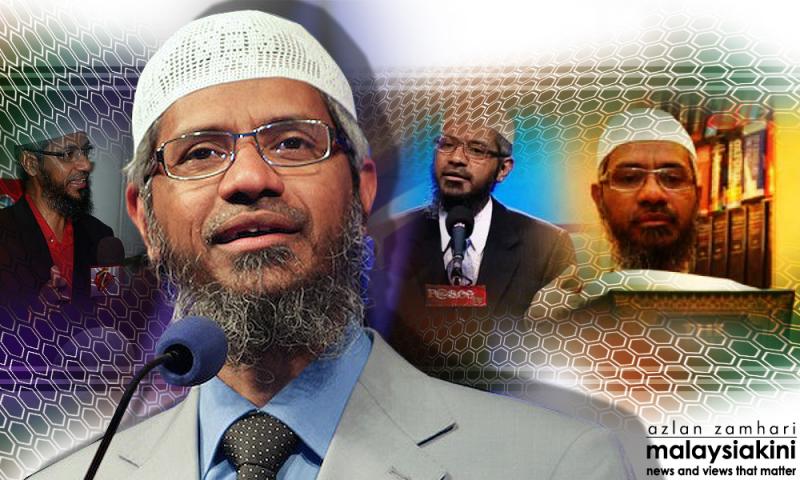KINIGUIDE Dr Zakir Naik is known as an "authority on comparative religion" but has also been described as a "radical televangelist".
His arrival in Malaysia this week triggered heated debates between his admirers and detractors.
But who exactly is Zakir Naik?
His full name is Zakir Abdul Karim Naik, born on Oct 18, 1965, in Mumbai, Maharashtra, India.
He currently resides in Dubai with his wife, Farhat, who is originally from Pune, India.
They have a son named Fariq and a daughter named Rushdaa. Both his children have followed in his footsteps to become preachers.
Zakir is a medical doctor who graduated with a Bachelor of Medicine and Surgery (MBBS) from the University of Mumbai.
In one of his public interviews, Zakir said both his father and brother were also doctors. He also has a sister.
Upon graduation, Zakir confronted his mother on whether she wanted him to become like South African surgeon Dr Christian Barnaard (recognised for performing the world's first human-to-human heart transplant) or South African preacher Sheikh Ahmad Deedat.
At that time, Zakir said, his mother wanted him to become both.
It was only after a few years that she finally gave full support for him to quit his own practice and focus full time on spreading the word of Islam.
And then what happened? How did he start as a preacher?
In 1991, Zakir started working in the field of dakwah and founded the Mumbai-based Islamic Research Foundation (IRF).
Zakir’s main inspiration came from the teachings of Ahmed Deedat, also known for his extensive knowledge of comparative religion.
Zakir is also now sometimes referred to as "Deedat plus" – a label reportedly given to him by Deedat himself.
How did he become so famous (or infamous)?
Zakir earned the reputation of being a “televangelist” after he founded the Dubai-based non-profit satellite television network Peace TV on Jan 21, 2006.
The 24-hour English language channel broadcasts globally in more than 200 countries, featuring Zakir’s lectures on various topics related to comparative religion.
Peace TV has an estimated audience exceeding 100 million, according to reports.
Aside from targeting English language speakers, Zakir also launched Peace TV Urdu in 2009 and Peace TV Bangla in 2011.
On YouTube, a simple search for his name currently yields more than 900,000 results from various countries.
Is that it?
No. Far from it. According to his IRF website, Zakir has delivered more than 2,000 public talks across the globe over the last 20 years.
Among the countries he has explored are the United States, Canada, United Kingdom, Italy, France, Arab Saudi, Australia, New Zealand, South Africa, Botswana, Nigeria, Ghana, Indonesia, Malaysia, Singapore, Brunei, Thailand, Hong Kong, China, Mauritius, Sri Lanka and the Maldives.
What does he talk about?
According to his public profiles, Zakir aims to clarify Islamic viewpoints and clear misconceptions about Islam using the Quran, Hadith and other religious scriptures as a basis, along with scientific facts.
In delivering his talks, Zakir is known for his ability to quote verses from various religious texts, including the Quran, Bible and Hindu Vedas.
He has reportedly been regarded as an exponent of the Salafi or Wahhabi views in Sunni Islam.
Both ideologies commonly refer to a more conservative and fundamental view of Islam.
Why are some people angry with him?
In Malaysia, protests against Zakir mostly centred around his allegedly anti-Hindu remarks made in the past.
Critics also claimed that Zakir had on numerous occasions misquoted or misinterpreted the Hindu scriptures he quoted in making comparisons between Hinduism and Islam.
In 2012, police reports were reportedly lodged across India over a quote attributed to Zakir, "If your 'Bhagwaan' cannot recognise his own son (Shri Ganesh), how will he recognise me if I fall into any difficulty?"
This was taken as a direct insult to a Hindu deity.
Other controversial quotes attributed to Zakir relate to his views on terrorism:
If bin Laden is fighting enemies of Islam, I am for him. If he is terrorising America – the terrorist, biggest terrorist – I am with him. Every Muslim should be a terrorist. The thing is that if he is terrorising the terrorist, he is following Islam. Whether he is or not, I don't know, but you as Muslims know that, without checking up, laying allegations is also wrong .
He was banned from entering the UK, Canada and Singapore because of this perceived hardline stand.
However, Zakir had in 2010 reportedly said that his quote was taken out of context.
Zakir also courted criticisms for his remarks in a 2007 interview with The Indian Express on the propagation of other faiths in Islamic states.
In response to a question, Zakir reportedly said that Muslims believe that only Islam is the true religion and so non-Muslims should not be allowed to propagate their religions.
In the Holy Quran (3:85), it is stated that God will never accept any religion other than Islam... regarding building of churches or temples is concerned, how can we allow this when their religion is wrong and when their worshipping is wrong?
Therefore, we will not allow such wrong things in our Islamic country.
But Malaysia welcomes him, right?
The short answer is yes. The longer answer is, depends on who you ask.
In 2013, Zakir was conferred the Ma'al Hijrah Distinguished Personality award by Yang di-Pertuan Agong Tuanku Abdul Halim Mu'adzam Shah.
He first came to Malaysia to speak in 2012. Zakir’s current visit is on the invitation of the Terengganu government and one of his lectures at Stadium Gong Badak attracted 30,000 attendees.
Other things we should know about him?
He was also ranked 89 on The Indian Express ' list of the "100 Most Powerful Indians in 2010".
In July 2013, Zakir was named as the Islamic Personality of the Year, announced by the 17th Dubai International Holy Quran Award (DIHQA).
On Feb 2, 2015, he was awarded the King Faisal International Prize for Service to Islam.





